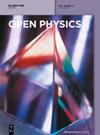Study on dynamic and static tensile and puncture-resistant mechanical properties of impregnated STF multi-dimensional structure Kevlar fiber reinforced composites
IF 1.8
4区 物理与天体物理
Q2 PHYSICS, MULTIDISCIPLINARY
引用次数: 0
Abstract
Shear thickening fluid (STF)-impregnated Kevlar fabric can be used as “Liquid armor” for the protection of weapons and equipment. The concentration of dispersed phase in STF and the fabric structure are important factors that affect the mechanical properties of composites. To obtain the mechanical properties of Kevlar fabric impregnated with STF, nano-sized silicon dioxide particles (SiO浸渍 STF 多维结构 Kevlar 纤维增强复合材料的动静态拉伸和抗穿刺力学性能研究
经剪切增稠液(STF)浸渍的凯夫拉纤维可用作保护武器装备的 "液体装甲"。STF 中分散相的浓度和织物结构是影响复合材料机械性能的重要因素。为了获得浸渍 STF 的 Kevlar 纤维的力学性能,研究人员分别以纳米级二氧化硅颗粒(SiO2)和聚乙二醇作为分散相和分散介质,通过浸渍具有二维平面和三维角交错结构的 Kevlar 纤维,得到了具有不同物理结构的浸渍 STF 的纤维增强复合材料织物。结果表明,当 STF 的浓度为 60% 时,STF 的剪切增厚行为最为明显。此外,织物结构和 STF 浓度对 STF/Kevlar 纤维增强复合材料的力学性能也有积极影响。与纯 Kevlar 纤维相比,STF/Kevlar 纤维增强复合材料三维角交错结构的最大拉伸载荷和最大穿刺载荷分别提高了 13,000 N 和 120 N 以上。研究结果可为 STF/Kevlar 纤维增强复合材料的力学性能和个体防护研究提供理论支持。
本文章由计算机程序翻译,如有差异,请以英文原文为准。
求助全文
约1分钟内获得全文
求助全文
来源期刊

Open Physics
PHYSICS, MULTIDISCIPLINARY-
CiteScore
3.20
自引率
5.30%
发文量
82
审稿时长
18 weeks
期刊介绍:
Open Physics is a peer-reviewed, open access, electronic journal devoted to the publication of fundamental research results in all fields of physics. The journal provides the readers with free, instant, and permanent access to all content worldwide; and the authors with extensive promotion of published articles, long-time preservation, language-correction services, no space constraints and immediate publication. Our standard policy requires each paper to be reviewed by at least two Referees and the peer-review process is single-blind.
 求助内容:
求助内容: 应助结果提醒方式:
应助结果提醒方式:


